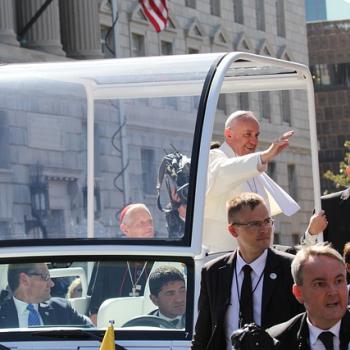What was important about this storytelling gimmick, if it is such a thing, is that it elevated the Live Together or Die Alone ethic to its ultimate possibilities. Damon said on Saturday that it was essential that these characters have the opportunity to learn and grow together—and thus to achieve their final destiny together.
And that they could only do so with the help of each other.
If there's a more profound dramatic witness than Lost to the fact that we are saved or damned in community, I don't know it. But in everything Damon has written, to every individual episode of Lost even, Damon said that he always begins with a question that goes deeper than plot: "What's it about?"
It's the same question Rowan Williams asks: "What are we really talking about?"
I think that, again, one of the things the Gospel ought to do is make us question the way we put our questions. . . . right throughout the ministry of Jesus as well as at His trial, a hostile person sitting there could say, "He never gives a straight answer to a straight question: 'Do we pay tribute to Caesar?'" And Jesus pushes it back and says, "What are we really talking about?" I think it's always important to ask before we make the snap answer: what are we really talking about?
Some watchers of Lost wanted a straight answer to a straight question, wanted a simple mystery solved before their eyes, as Jeff Jensen noted in Entertainment Weekly. But Damon Lindelof and the writers of Lost were never answering a simple question. They were asking larger questions—How do we live? Why do we gather in community? What is it all for?—and coming to the answer: "If we can't learn to grow together in community, we will end up as lonely and lost individuals."
On Saturday in Austin, Damon's answer to a final question from the audience was that he never tries to frontload his stories with spiritual or philosophical content. But, he said, there's no avoiding the fact that a writer's thoughts about those larger questions work into his work.
From the beginning, Damon Lindelof knew that Lost was going to be a show about people who were lost in every way that human beings can be lost, and how—together, and only together—they were ultimately going to find themselves and be found.
If there was ever a time that we needed to be reminded how much we need each other—to hear it, to teach it, and to live it—that time is now.
Because if we can't live together, we're going to die alone.





